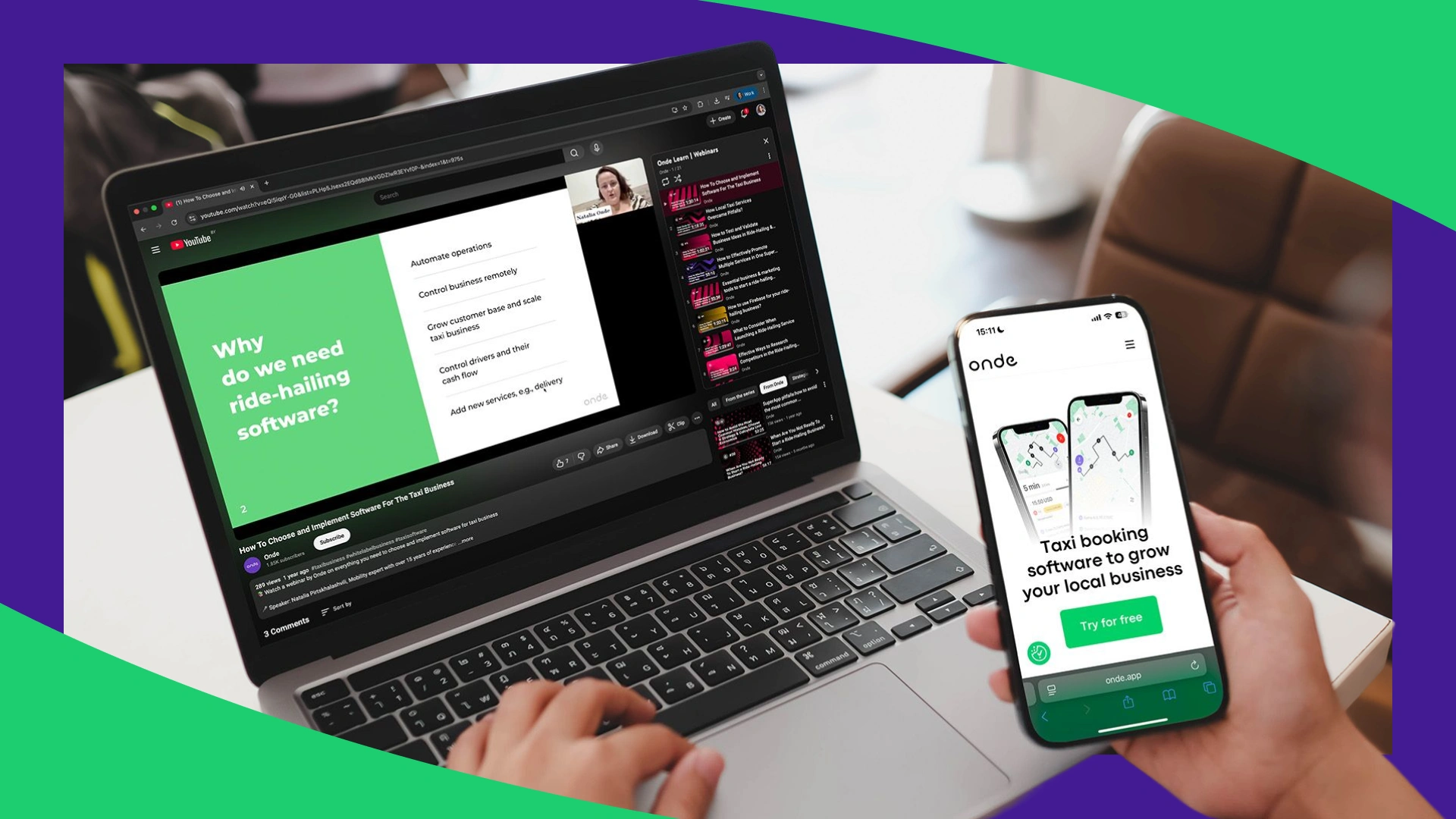Women in Mobility: Driving Progress with Onde
At Onde, we believe that technology is only part of the story. The other part is people — and how inclusive, diverse, and driven the teams are that deliver mobility services around the world.
Today, we spotlight women-led businesses, women-for-women services, and the real stories in our case studies.

Why focus on women in mobility?
The mobility sector — ride-hailing, private hire, chauffeur services — is often male-dominated in both operations and leadership. Yet the tides are changing. Today, more women in tech are founding companies in traditionally male sectors, such as mobility and logistics. For example, in 2023, the EIT Urban Mobility accelerator & scale‑up program selected 86 startups, and of those, over 30% were led by female CEOs or founders.
These trends matter because:
- Expansion in driver supply: The most common problem new ride-hailing businesses face is a shortage of drivers. Engaging women as drivers unlocks an underused resource pool and attracts more drivers.
- Service differentiation: Women riders often prioritize safety, comfort, and trust. Women-for-women mobility models have shown constant growth in demand.
- Leadership & inclusion: Women in tech tend to bring varied perspectives on culture, support, work-life flexibility, and social mission.
- Brand trust & social impact: Mobility operators that show commitment to inclusion and safety build stronger reputations, especially in markets where female drivers or riders feel marginalized
At Onde, we encourage women entrepreneurs to join the mobility industry. With regular webinars and networking events, we help women build a supportive network (especially with other women founders), pitch with strong data, and stay true to their leadership style.

Just as important is focusing on women as clients.
Statistics from all over the world suggest women use ride‑hailing services at equal or higher rates than men, which means ride-hailing businesses should focus on female needs and pain points. Women tend to have more safety concerns than men, which leads to the growing demand for women-for-women service (female taxi) that many mobility companies offer in 2025.
Real-world Case Studies: Onde in action
Let’s bring theory to practice. Many Onde’s clients are founded or co-founded by women (e.g., Loyal Transportation in Canada) or offer women-for-women services (e.g., UMD - worldwide, Ray app in Nicaragua, Kaiian’s Wisslini in Saudi Arabia).
However, some brands that use the Onde platform have gone further and created ride-hailing platforms that focus solely on women:
HerRyde (Nigeria): Women-only ride-hailing platform
About the business
HerRyde is Nigeria’s first women-only ride-hailing platform, for women drivers and women riders.

Impact & lessons
- Tackled the safety and trust gap many female riders feel by ensuring that both driver and rider are women.
- Opened opportunities for women to drive in a sector typically dominated by men.
- Used Onde’s platform flexibility to support niche, mission-driven mobility models.
Almeny (Saudi Arabia): Teaching women to drive
About the business
Almeny is a Saudi initiative that pairs female instructors with female learners. As women gained legal rights to drive in Saudi Arabia, Almeny stepped in with a customer and driver app + instructor network powered by Onde’s dispatch and platform system.

Impact & lessons
- Contributed to social change by facilitating women’s mobility and economic participation.
- Expanded where mobility tech can go — beyond passenger service into training, education, and structured programs.
- Validated that mobility platforms can include education, empowerment, and community.
What Onde brings to enable women-led / women-centric mobility
Onde’s platform is designed to support mobility operations of many shapes and missions. Here’s how we help women-led or women-for-women mobility services thrive:
- Modular & flexible platform: Whether you’re doing ride-hailing, chauffeur, driver training, or women-only services, the same backend dispatch/payment/analytics can adapt.
- Built for niche and diverse services: Onde provides more than 40 service types: you can build a brand with women-for-women services, plus 39 other types of services!
- Growth & branding support: We encourage mission differentiation — women-safety, inclusion, recruitment narratives — that help operators stand out, especially in competitive mobility markets. With Onde marketing services, we can create effective campaigns that will attract customers and drivers and ensure top positions in app stores.
- Community & network: As a part of Onde’s ecosystem, mobility founders can share knowledge, connect, and build relationships to mitigate the isolation that some women founders face. We offer regular webinars with other founders and organize events and conferences for learning and networking.
Looking ahead: The road to 2030
As mobility evolves, women-led and women-centric services are becoming key drivers of inclusion, innovation, and safety. These businesses are redefining what modern transportation looks like.
Safety-first mobility models will remain essential. Women-only and women-preferred ride options directly address safety concerns, building trust, loyalty, and new market opportunities where comfort and reliability matter most.
Growth through inclusion will also shape the future. With driver shortages across many regions, attracting and supporting women drivers isn’t just fair — it’s smart business. Diversity among drivers enhances service quality, community engagement, and retention.
Hybrid mobility education models will combine transport with learning and empowerment. Platforms like Almeny in Saudi Arabia show how driver training, mentorship, and ride-hailing can merge to create new opportunities for women to learn, earn, and lead.
Gender data as a differentiator will help companies stand out in the competitive market of mobility services.
Finally, partnerships and regulation will be critical. Collaboration among governments, NGOs, and private operators can accelerate women’s access to safe, equitable transport — especially in regions undergoing social change.
Together, these trends point toward a future where mobility is built on inclusion, trust, and opportunity, and Onde is here to do its part.
